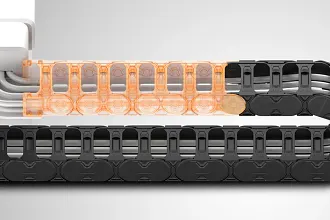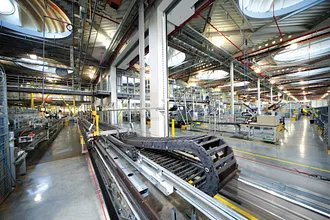Change Language :

Energy chains - chemical resistance of igumid materials
The materials from which energy chains are manufactured must withstand a great deal: compressive load and tensile strain, abrasion resistance, excellent toughness, high modulus of elasticity, high stability at high and low temperatures, suitable for outdoor use. To ensure this, igus energy chains are made from the high-performance polymer igumid. Numerous application examples, from refrigerator blocks to steel mills, prove this.
igumid G - the base material for most applications
The majority of possible applications can be realised with the base material igumid G alone. The cost-effective material fulfils even contradictory requirements. It can withstand continuous temperatures from -40°C to well over 100°C, which allows it to be used in cold stores and steelworks. Even applications in snow and ice run smoothly in practice. Discover the energy chains with the material igumid G.
igumid NB gives easy chain® energy chains the required flexibility
Comparable performance values apply to igumid NB, the standard material for all easy chain® type energy chains.
The e-chains® in this series are extremely easy to fill. The cables are simply pressed in by hand thanks to flexible and split opening bars. Accordingly, a material is selected here that combines flexibility and strength in the required manner.
igumid TE
If even higher demands are placed on the permanent elasticity and flexibility of energy chain components, the igumid TE is used. It is used, e.g. in the connectors of the E6 chains developed for extreme dynamics or in the particularly tear-resistant and flexible lid of the zipper e-chains®.
igumid EG+ - resists even aggressive chemicals
The newest member of the chain material family is igumid EG+. The material is characterised by extremely low total moisture absorption and is therefore also highly resistant to chemicals. igumid EG+ was specially developed for applications with aggressive chemicals, such as those used in electroplating or fertiliser production, and is used there for both energy chains and trough systems. Where previously expensive stainless steel had to be used as a trough material, igumid EG+ offers a cost-effective alternative. The material, which is immediately recognisable by its blue colour, can be used for most e-chains® series in a temperature range from 0°C to +100°C. It is thereby halogen-free and silicone-free as well as RoHS-compliant.
igumid HT protects against glowing swarf
If energy, signals and media need to be moved flexibly in machine tools, e-tubes are the ideal solution. Their closed design prevents swarf from penetrating inside. Tubes made from the special material igumid HT also ensure that hot swarf cannot adhere at temperatures of up to 850°C. All tubes in the R2, R4 and RX series are available as heat-resistant HT versions. This gives manufacturers of foundry machines and other metal processing equipment the opportunity to replace metal energy supplies with more flexible and significantly lighter energy chains made from the high-performance plastic.
igumid DT is magnetically detectable
The development of the plastic compound igumid DT was aimed in particular at applications throughout food production. The base material was modified in such a way that even the smallest fragments from 1mm are recognised by all standard detection systems. This means that any splinters can be detected and automatically ejected.
igumid ESD: protection against electrostatic charges
ESD-compliant solutions and tools are used in many industries to protect sensitive electronic components from electrostatic discharge. This applies in particular to moving components such as energy supplies. With igumid ESD, igus® has a material in its product range that has been designed precisely for this demanding application and immediately dissipates any electrostatic charges in a controlled manner. In contrast to applied conductive layers or volatile incorporated antistatic agents, the material additives used result in permanent conductivity that makes regular maintenance unnecessary. igumid ESD is also the perfect material for energy chains that are used in potentially explosive gas and dust atmospheres and therefore in explosion risk areas. Such working environments are found primarily in the chemical industry, but also when filling powdery or dusty goods. In these applications, the ability of igumid ESD to dissipate static charges can mean the avoidance of potential ignition sources in potentially explosive environments. The plastic, which has been tested with over 10 million cycles, even surpasses the standard material igumid G in some mechanical requirements.
igumid XXL stands for large unsupported length and higher fill weights
Up to seven metres unsupported length, without guide trough and supports. This requirement for the optimum e-chains® solution can be realised with the material igumid XXL. Alternatively, higher fill weights can be achieved with the same unsupported length. Assembly work and costs can also be saved, as gliding applications are generally more complex because longer chains, additional guide troughs and more installation space are required. The material is primarily used in applications for handling and conveyor systems, construction and heavy machinery and large robots.
The following list provides detailed information on the resistance of the igus materials igumid G, NB and TE to many chemical substances. The values given are material-specific values determined by igus laboratory tests. All values apply to black energy chain. If your chemicals are not included in the list, please contact us. We will be happy to test upon request.
| Medium | Concentration-weight % | igumid G and NB | igumid TE |
|---|---|---|---|
| Acetone | 100 | ++ | ++ |
| Formic acid (aqueous) | 2 | + | ++ |
| Ammonia (aqueous) | 10 | ++ | ++ |
| Gasoline | 100 | ++ | ++ |
| Benzene | 100 | ++ | ++ |
| Bitumen | 100 | + | - |
| Boric acid (aqueous) | 10 | ++ | + |
| Butyric acid | 100 | + | - |
| Calcium chloride (aqueous) | Sat. aq. sol. | ++ | ++ |
| Chlorinated hydrocarbons | ++ | + | |
| Chlorine water | Sat. aq. sol. | - | - |
| Chromic acid (aqueous) | 1 | + | - |
| Diesel oil | 100 | ++ | ++ |
| Acetic acid | 2 | ++ | ++ |
| Colour | ++ | ++ | |
| Greases, cooking fat | ++ | ++ | |
| Fluorinated hydrocarbons | ++ | ++ | |
| Formaldehyde (aqueous) | 30 | + | + |
| Hydraulic oils | ++ | + | |
| Caustic potash | 10 | ++ | ++ |
| Potassium carbonate (aqueous) | 60 | ++ | ++ |
| Potassium sulphate (aqueous) | 100 | ++ | ++ |
| Methyl acetate | 100 | ++ | ++ |
| Milk | ++ | ++ | |
| Mineral oil | ++ | ++ | |
| Sodium carbonate (aqueous) | 50 | ++ | ++ |
| Oil, lubricating oil | ++ | ++ | |
| Oil, cooking | ++ | ++ | |
| Oleic acid | 100 | ++ | ++ |
| Paraffin oil | ++ | ++ | |
| Perchloroethylene | 100 | ++ | ++ |
| Polyester resins (with styrene) | ++ | ++ | |
| Propane gas | ++ | ++ | |
| Mercury | ++ | ++ | |
| Hydrochloric acid | pH2 | + | - |
| Hydrochloric acid | 2 | - | - |
| Hydrochloric acid | 10 | - | - |
| Ink, printing ink | ++ | ++ | |
| Vaseline | ++ | ++ | |
| Tartaric acid | + | ++ | |
| Zinc sulphate (aqueous) | 10 | ++ | - |
Selected application examples with energy chains
More information

Energy chain shop
With over 100,000 products: from small, medium and large energy chains to customised solutions.

Knowledge base of energy chains
Find all the most important information as well as questions and answers about energy chains.

Online seminar
Benefit from the knowledge and experience of our experts.

Tested!
Every year, 3,000 e-chains are tested to withstand the toughest conditions.
Go to the Energy Chains test laboratoryConsulting
I look forward to answering your questions
Hennlich OOD | Хенлих ООД+359 32 621929Write e-mail
Shipping and consultation
In person:
Monday to Friday from 7 am - 8 pm.
Saturdays from 8 am- 12 pm.
Online:
24h
WhatsApp-Service:
Montag – Freitag: 8 – 16 Uhr





